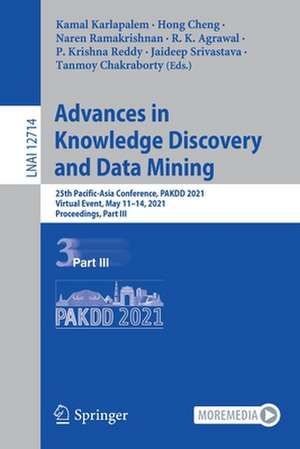Advances in Knowledge Discovery and Data Mining: 25th Pacific-Asia Conference, PAKDD 2021, Virtual Event, May 11–14, 2021, Proceedings, Part III: Lecture Notes in Computer Science, cartea 12714
Editat de Kamal Karlapalem, Hong Cheng, Naren Ramakrishnan, R. K. Agrawal, P. Krishna Reddy, Jaideep Srivastava, Tanmoy Chakrabortyen Limba Engleză Paperback – 8 mai 2021
Part I: Applications of knowledge discovery and data mining of specialized data;
Part II: Classical data mining; data mining theory and principles; recommender systems; and text analytics;
Part III: Representation learning and embedding, and learning from data.
| Toate formatele și edițiile | Preț | Express |
|---|---|---|
| Paperback (3) | 596.63 lei 6-8 săpt. | |
| Springer International Publishing – 8 mai 2021 | 596.63 lei 6-8 săpt. | |
| Springer International Publishing – 8 mai 2021 | 670.37 lei 6-8 săpt. | |
| Springer International Publishing – 9 mai 2021 | 673.83 lei 6-8 săpt. |
Din seria Lecture Notes in Computer Science
- 20%
 Preț: 1061.55 lei
Preț: 1061.55 lei - 20%
 Preț: 307.71 lei
Preț: 307.71 lei - 20%
 Preț: 438.69 lei
Preț: 438.69 lei - 20%
 Preț: 645.28 lei
Preț: 645.28 lei -
 Preț: 410.88 lei
Preț: 410.88 lei - 15%
 Preț: 580.46 lei
Preț: 580.46 lei - 17%
 Preț: 427.22 lei
Preț: 427.22 lei - 20%
 Preț: 596.46 lei
Preț: 596.46 lei -
 Preț: 381.21 lei
Preț: 381.21 lei - 20%
 Preț: 353.50 lei
Preț: 353.50 lei - 20%
 Preț: 1414.79 lei
Preț: 1414.79 lei - 20%
 Preț: 309.90 lei
Preț: 309.90 lei - 20%
 Preț: 583.40 lei
Preț: 583.40 lei - 20%
 Preț: 1075.26 lei
Preț: 1075.26 lei - 20%
 Preț: 310.26 lei
Preț: 310.26 lei - 20%
 Preț: 655.02 lei
Preț: 655.02 lei - 20%
 Preț: 580.93 lei
Preț: 580.93 lei - 20%
 Preț: 340.32 lei
Preț: 340.32 lei - 15%
 Preț: 438.59 lei
Preț: 438.59 lei - 20%
 Preț: 591.51 lei
Preț: 591.51 lei - 20%
 Preț: 649.49 lei
Preț: 649.49 lei - 20%
 Preț: 337.00 lei
Preț: 337.00 lei -
 Preț: 449.57 lei
Preț: 449.57 lei - 20%
 Preț: 607.39 lei
Preț: 607.39 lei - 20%
 Preț: 1024.44 lei
Preț: 1024.44 lei - 20%
 Preț: 579.30 lei
Preț: 579.30 lei - 20%
 Preț: 763.23 lei
Preț: 763.23 lei - 20%
 Preț: 453.32 lei
Preț: 453.32 lei - 20%
 Preț: 575.48 lei
Preț: 575.48 lei - 20%
 Preț: 585.88 lei
Preț: 585.88 lei - 20%
 Preț: 825.93 lei
Preț: 825.93 lei - 20%
 Preț: 763.23 lei
Preț: 763.23 lei - 17%
 Preț: 360.19 lei
Preț: 360.19 lei - 20%
 Preț: 1183.14 lei
Preț: 1183.14 lei - 20%
 Preț: 340.32 lei
Preț: 340.32 lei - 20%
 Preț: 504.57 lei
Preț: 504.57 lei - 20%
 Preț: 369.12 lei
Preț: 369.12 lei - 20%
 Preț: 583.40 lei
Preț: 583.40 lei - 20%
 Preț: 343.62 lei
Preț: 343.62 lei - 20%
 Preț: 350.21 lei
Preț: 350.21 lei - 20%
 Preț: 764.89 lei
Preț: 764.89 lei - 20%
 Preț: 583.40 lei
Preț: 583.40 lei -
 Preț: 389.48 lei
Preț: 389.48 lei - 20%
 Preț: 341.95 lei
Preț: 341.95 lei - 20%
 Preț: 238.01 lei
Preț: 238.01 lei - 20%
 Preț: 538.29 lei
Preț: 538.29 lei
Preț: 596.63 lei
Preț vechi: 745.79 lei
-20% Nou
Puncte Express: 895
Preț estimativ în valută:
114.18€ • 118.53$ • 95.21£
114.18€ • 118.53$ • 95.21£
Carte tipărită la comandă
Livrare economică 22 martie-05 aprilie
Preluare comenzi: 021 569.72.76
Specificații
ISBN-13: 9783030757670
ISBN-10: 3030757676
Pagini: 434
Ilustrații: XXIII, 434 p. 142 illus., 117 illus. in color.
Dimensiuni: 155 x 235 mm
Greutate: 0.64 kg
Ediția:1st ed. 2021
Editura: Springer International Publishing
Colecția Springer
Seriile Lecture Notes in Computer Science, Lecture Notes in Artificial Intelligence
Locul publicării:Cham, Switzerland
ISBN-10: 3030757676
Pagini: 434
Ilustrații: XXIII, 434 p. 142 illus., 117 illus. in color.
Dimensiuni: 155 x 235 mm
Greutate: 0.64 kg
Ediția:1st ed. 2021
Editura: Springer International Publishing
Colecția Springer
Seriile Lecture Notes in Computer Science, Lecture Notes in Artificial Intelligence
Locul publicării:Cham, Switzerland
Cuprins
Representation Learning and Embedding.- Episode Adaptive Embedding Networks for Few-shot Learning.- Universal Representation for Code.- Self-supervised Adaptive Aggregator Learning on Graph.- A Fast Algorithm for Simultaneous Sparse Approximation.- STEPs-RL: Speech-Text Entanglement for Phonetically Sound Representation Learning.- RW-GCN: Training Graph Convolution Networks with biased random walk for Semi-Supervised Classification.- Loss-aware Pattern Inference: A Correction on the Wrongly Claimed Limitations of Embedding Models.- SST-GNN: Simplified Spatio-temporal Traffic forecasting model using Graph Neural Network.- VIKING: Adversarial Attack on Network Embeddings via Supervised Network Poisoning.- Self-supervised Graph Representation Learning with Variational Inference.- Manifold Approximation and Projection by Maximizing Graph Information.- Learning Attention-based Translational Knowledge Graph Embedding via Nonlinear Dynamic Mapping.- Multi-Grained Dependency Graph Neural Network for Chinese Open Information Extraction.- Human-Understandable Decision Making for Visual Recognition.- LightCAKE: A Lightweight Framework for Context-Aware Knowledge Graph Embedding.- Transferring Domain Knowledge with an Adviser in Continuous Tasks.- Inferring Hierarchical Mixture Structures: A Bayesian Nonparametric Approach.- Quality Control for Hierarchical Classification with Incomplete Annotations.- Learning from Data.- Learning Discriminative Features using Multi-label Dual Space.- AutoCluster: Meta-learning Based Ensemble Method for Automated Unsupervised Clustering.- BanditRank: Learning to Rank Using Contextual Bandits.- A compressed and accelerated SegNet for plant leaf disease segmentation: A Differential Evolution based approach.- Meta-Context Transformers for Domain-Specific Response Generation.- A Multi-task Kernel Learning Algorithm for Survival Analysis.- Meta-data Augmentation based Search Strategy through Generative Adversarial Network for AutoML Model Selection.- Tree-Capsule: Tree-Structured Capsule Network for Improving Relation Extraction.- Rule Injection-based Generative Adversarial Imitation Learning for Knowledge Graph Reasoning.- Hierarchical Self Attention Based Autoencoder for Open-Set Human Activity Recognition.- Reinforced Natural Language Inference for Distantly Supervised Relation Classification.- SaGCN: Structure-aware Graph Convolution Network for Document-level Relation Extraction.- Addressing the class imbalance problem in medical image segmentation via accelerated Tversky loss function.- Incorporating Relational Knowledge in Explainable Fake News Detection.- Incorporating Syntactic Information into Relation Representations for Enhanced Relation Extraction.
